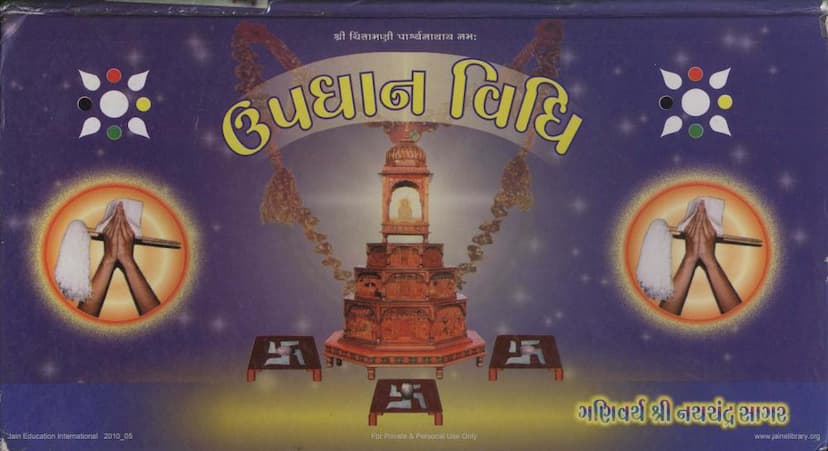Updhan Vidhi
Added to library: September 2, 2025

Summary
This document is a comprehensive guide to the Upadhan Vidhi, a significant ritual and practice within Jainism, authored by Naychandrasagar and published by Purnanand Prakashan. The book is intended for Jain Education International and for private/personal use only.
The text meticulously details the process and significance of the Upadhan Vidhi, which is a preparatory ritual undertaken before studying or reciting sacred Jain scriptures (Sutras). It emphasizes that proper Upadhan is crucial for gaining the right understanding and benefit from these scriptures, equating an improper approach to feeding poison to a child or filling water in an unfired pot, which leads to destruction for both the pot and the water.
Here's a breakdown of the key themes and content covered in the document:
1. Significance and Purpose of Upadhan:
- Scriptural Authority: The text cites various Jain scriptures like the Vyavahar Sutra, Dashavaikalik Niryukti, Panchasutrakara, and Mahanishith Sutra to establish the necessity and importance of Upadhan.
- Eligibility for Knowledge: Upadhan is presented as a means to prepare an individual (both ascetics and householders) to receive and absorb scriptural knowledge, ensuring it leads to liberation and spiritual growth.
- Purification and Merit: The rituals involved in Upadhan are designed to purify the mind, overcome attachments and delusions (moha), and accumulate merit.
- Overcoming Ignorance: It is stated that studying scriptures without proper Upadhan is considered "ear-theft" (karna chor) and can lead to an unending cycle of birth and death (anant sansari).
2. The Upadhan Process and its Components:
- Six Types of Upadhan: The text outlines six main types of Upadhan, each with specific durations and fasting requirements (like 5 days of fasting, 8 Ayambil, 3 days of fasting, etc.). The cumulative duration can be around 110 days with significant fasting.
- Dietary Restrictions: Emphasis is placed on performing the Upadhan fasts through Pausadh (observing a day of strict religious observance with fasting and abstinence).
- Daily Rituals: The book details daily routines for the aspirants, including morning and evening prayers (pratikraman), devvandan (worship), pausadh-padilehan (cleaning of utensils and belongings), and specific chants and recitations.
- Specific Procedures: Detailed instructions are provided for various rituals, including:
- Naan Mandavani (Setting up the altar/sacred space): This involves elaborate preparations, decorations, and placing of divine figures.
- Upadhan Pravesh Vidhi (Initiation Ritual): This marks the formal commencement of the Upadhan. It includes various steps like Vajrapanjar Stotra, Pausadh rituals, Nandi rituals, Samyakva Danda recitation, and seeking permission from the Guru.
- Various Vachanas (Recitations): The book outlines specific vachanas or scriptural recitations for each of the six Upadhan types, including their meaning and the number of days for their completion. These include scriptures like Panchamangal Mahashrutaskandh, Pratikraman Shrutaskandh, Shakastava Adhyayan, Chaitrastava Adhyayan, Namastava Adhyayan, and Shrutastava Siddhastava Adhyayan.
- Paveyana Vidhi: A ritual of receiving permission and instructions for recitations.
- Guruhastak (Reciting verses related to Gurus).
- Mala Paridhan (Wearing the sacred garland): This is a significant ritual marking the completion of certain stages of Upadhan.
- Sankalp Patrak (Pledge Form): A document for aspirants to commit to the vows and practices.
- Ritual Materials: A list of necessary items for the rituals is provided.
- Guidelines for Sadhvis (Nuns): Specific instructions tailored for female aspirants are also included.
- Khamasaman Vidhi: Detailed procedures for seeking forgiveness and performing obeisance.
- Kaussagga Vidhi: Instructions for meditative concentration and posture.
- Navkaravali: The importance and method of reciting the Navkar mantra.
- Pachakkhan Vidhi: Procedures for taking and breaking fasts.
- Pardilehan Vidhi: Methods for purifying oneself and one's belongings.
- Alochana (Confession): Reasons for confessing sins and the consequences of not performing certain rituals correctly.
- Sen Prashna: A question-and-answer section addressing specific queries related to Upadhan practices and interpretations.
- Rishimandal Stotra: A powerful mantra for protection and spiritual elevation.
3. Spiritual and Practical Benefits:
- Overcoming Karma: The text highlights how the rigorous practices of Upadhan, like reciting the Navkar mantra and Logass, help in destroying negative karma and accumulating merit.
- Spiritual Realization: It states that by diligently performing Upadhan, aspirants can attain right faith (Samyak Darshan), right knowledge (Samyak Gyan), and right conduct (Samyak Charitra), leading to spiritual progress and potentially liberation.
- Community and Guidance: The process involves the guidance of qualified Gurus and participation within a community of aspirants, fostering spiritual discipline and collective merit.
4. Specific Instructions and Adaptations:
- Timings and Procedures: The text gives precise timings for various rituals and emphasizes adherence to the prescribed sequence.
- Flexibility and Exceptions: While stressing the importance of the prescribed methods, it also mentions some flexibility or exceptions based on specific circumstances or interpretations from the scriptures and respected Acharyas.
- Sanitation and Purity: Strict emphasis on cleanliness and purity in all aspects of the rituals.
- Prohibited Actions: Specific prohibitions are listed for aspirants to maintain purity and prevent breaches of conduct.
5. Historical Context and Endorsement:
- Lineage of Gurus: The book acknowledges the blessings and guidance received from esteemed Jain Acharyas, including Pujya Mohopadhyaya Shri Dharmasagarji M., Pujya Nyas Pravar Shri AbhaySagariji M., and others, signifying the traditional and authoritative nature of the content.
- Dedication: The text is dedicated to Pujya Mohopadhyaya Shri Dharmasagarji M. for his exceptional feat of guiding 1000 aspirants through Upadhan on the holy land of Kutch Palitana.
In essence, "Upadhan Vidhi" serves as a sacred manual for those seeking to embark on a profound spiritual journey through this specific Jain ritual. It underscores the belief that meticulous adherence to these ancient practices is vital for purifying the soul, gaining true scriptural wisdom, and ultimately progressing on the path to liberation.